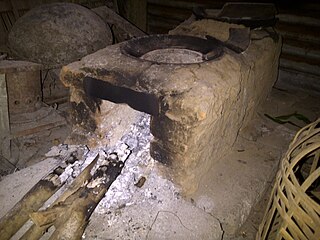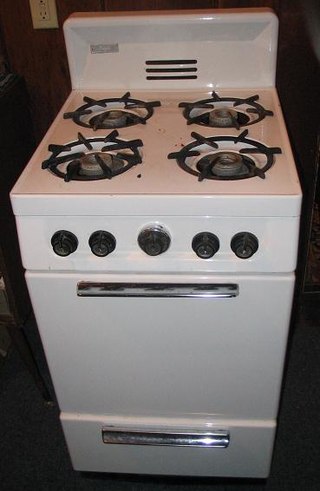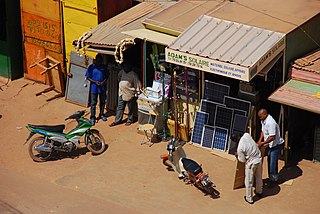Envirofit International is an American non-profit organization. It develops technology which aims to reduce air pollution and enhance energy efficiency among developing nations.
Among its products have been affordable clean burning stoves for poorer communities. [1]
It is based in Fort Collins, Colorado, Envirofit was founded in 2003 by Tim Bauer, Nathan Lorenz, Paul Hudnut, and Bryan Willson. [2]
Envirofit International began in 2003 as an adjunct program to the Colorado State University Engines and Energy Conversion Laboratory. The program's goals were to bring sustainable clean energy solutions to help solve health and energy challenges on a global scale.
The first product was a retrofit direct injection technology to reduce pollution from two-stroke cycle vehicle engines in the Philippines. This project won the Rolex Award for Enterprise in 2008. [3]
In 2007, Envirofit partnered with the Shell Foundation's Breathing Space Program to develop clean cooking stoves. [4] They were designed to withstand high temperatures and frequent use at a low cost. Most of the target market is in the bands of people below the poverty line. [5]
In 2009, Lorenz and Bauer were named Heroes of the Environment by Time magazine. [6]
In 2013, The Economist named the Envirofit founder as innovators of the year. [2]

A stove or range is a device that generates heat inside or on top of the device, for local heating or cooking. Stoves can be powered with many fuels, such as electricity, natural gas, gasoline, wood, and coal.

A gas stove is a stove that is fuelled by combustible gas such as natural gas, propane, butane, liquefied petroleum gas, syngas, or other flammable gas. Before the advent of gas, cooking stoves relied on solid fuels such as coal or wood. The first gas stoves were developed in the 1820s and a gas stove factory was established in England in 1836. This new cooking technology had the advantage of being easily adjustable and could be turned off when not in use. The gas stove, however, did not become a commercial success until the 1880s, by which time supplies of piped gas were available in cities and large towns in Britain. The stoves became widespread on the European Continent and in the United States in the early 20th century.

Since 1976, through the Rolex Awards for Enterprise, Rolex has supported exceptional individuals who have the courage and conviction to take on major challenges; men and women who have a spirit of enterprise, initiating extraordinary projects that make the world a better place. Each winner receives 100,000 Swiss francs.
Design for the environment (DfE) is a design approach to reduce the overall human health and environmental impact of a product, process or service, where impacts are considered across its life cycle. Different software tools have been developed to assist designers in finding optimized products or processes/services. DfE is also the original name of a United States Environmental Protection Agency (EPA) program, created in 1992, that works to prevent pollution, and the risk pollution presents to humans and the environment. The program provides information regarding safer chemical formulations for cleaning and other products. EPA renamed its program "Safer Choice" in 2015.

Clean fuel may refer to type of fuel used for transport or a type of fuel used for cooking and lighting. With regards to cooking, the Sustainable Development Goal 7 aims to "Ensure access to affordable, reliable, sustainable and modern energy for all." Clean fuel there is defined by the emission rate targets and specific fuel recommendations included in the normative guidance WHO guidelines for indoor air quality. Clean fuel is one component of sustainable energy.

Household air pollution (HAP) is a significant form of indoor air pollution mostly relating to cooking and heating methods used in developing countries. Since much of the cooking is carried out with biomass fuel, in the form of wood, charcoal, dung, and crop residue, in indoor environments that lack proper ventilation, millions of people, primarily women and children face serious health risks. In total, about three billion people in developing countries are affected by this problem. The World Health Organization (WHO) estimates that cooking-related pollution causes 3.8 million annual deaths. The Global Burden of Disease study estimated the number of deaths in 2017 at 1.6 million. The problem is closely related to energy poverty and cooking.

A green-collar worker is a worker who is employed in an environmental sector of the economy. Environmental green-collar workers satisfy the demand for green development. Generally, they implement environmentally conscious design, policy, and technology to improve conservation and sustainability. Formal environmental regulations as well as informal social expectations are pushing many firms to seek professionals with expertise with environmental, energy efficiency, and clean renewable energy issues. They often seek to make their output more sustainable, and thus more favorable to public opinion, governmental regulation, and the Earth's ecology.
Clean growth is goal 7 of the UN's sustainability goals, first published in 2009. Clean growth refers to economic growth that is energy efficient, uses sustainable agricultural practices, and uses renewable energy technologies according to the ‘Poles’ outlined in the UN's Sustainable Development Goals. In other words, it is economic growth tied to conscious and sustainable principles with the aim of reducing, minimising, or eliminating altogether the potential negative side effects that economic and income growth can have on the environment.

Renewable energy in developing countries is an increasingly used alternative to fossil fuel energy, as these countries scale up their energy supplies and address energy poverty. Renewable energy technology was once seen as unaffordable for developing countries. However, since 2015, investment in non-hydro renewable energy has been higher in developing countries than in developed countries, and comprised 54% of global renewable energy investment in 2019. The International Energy Agency forecasts that renewable energy will provide the majority of energy supply growth through 2030 in Africa and Central and South America, and 42% of supply growth in China.

A wood-burning stove is a heating or cooking appliance capable of burning wood fuel, often called solid fuel, and wood-derived biomass fuel, such as sawdust bricks. Generally the appliance consists of a solid metal closed firebox, often lined by fire brick, and one or more air controls. The first wood-burning stove was patented in Strasbourg in 1557. This was two centuries before the Industrial Revolution, so iron was still prohibitively expensive. The first wood-burning stoves were high-end consumer items and only gradually became used widely.
Alexis T. Belonio is a professor, engineer, scientist, innovator and inventor from the Philippines. He was "the first Filipino to receive the Rolex Award for Enterprise" in 2008 for his invention of a low-cost and environment friendly rice husk stove. Belonio was included by the Rolex watchmaking company on its list of 10 model innovators in November 2008. He serves as the incumbent chair of the Agricultural Engineering and Environmental Management department of Central Philippine University.
The Building and Construction Improvement Program(BACIP) is a program of the Aga Khan Planning and Building Service, Pakistan (AKPBS,P) that is engaged in developing and promoting solutions to housing and built environment-related issues of rural communities living in Gilgit-Baltistan and the province of Sindh.

Project Gaia is a U.S.-based non-governmental, non-profit organization engaged in developing alcohol-based fuel markets for household use in Ethiopia and other developing countries. The organization identifies alcohol fuels as a potential alternative to traditional cooking methods, which they suggest may contribute to fuel shortages, environmental issues, and public health concerns in these regions. Focusing on impoverished and marginalized communities, Project Gaia is active in Ethiopia, Nigeria, Brazil, Haiti, and Madagascar. The organization is also planning to expand its projects to additional countries.
E+Co is a non-governmental organization based in Bloomfield, New Jersey, United States, that from its founding in 1994 to its restructuring in 2012 made over 250 clean energy investments in developing countries. Over these 18 years, E+Co maintained field offices in San Jose, Costa Rica, Bangkok, Thailand, Dar es Salaam, Tanzania and Accra, Ghana. The company's name is pronounced, "E and Co".
Energy use and development in Africa varies widely across the continent, with some African countries exporting energy to neighbors or the global market, while others lack even basic infrastructures or systems to acquire energy. The World Bank has declared 32 of the 48 nations on the continent to be in an energy crisis. Energy development has not kept pace with rising demand in developing regions, placing a large strain on the continent's existing resources over the first decade of the new century. From 2001 to 2005, GDP for over half of the countries in Sub Saharan Africa rose by over 4.5% annually, while generation capacity grew at a rate of 1.2%.

A clean-burning stove is a stove with reduced toxic and polluting emissions. The term refers to solid-fuel stoves such as wood-burning stoves for either domestic heating, domestic cooking or both. In the context of a cooking stove, especially in lower-income countries, such a stove is distinct from a clean-burning-fuel stove, which typically burns clean fuels such as ethanol, biogas, LPG, or kerosene. Studies into clean-burning cooking stoves in lower-income countries have shown that they reduce the emissions of dangerous particulates and carbon monoxide significantly, use less fuel than regular stoves, and result in fewer burn injuries. However, the emissions some supposedly clean-burning cookstoves produce are still much greater than safe limits, and in several studies in lower income countries they did not appear to be effective at reducing illnesses such as pneumonia induced by breathing polluted air, which may have many sources.

BioLite is a New York City-based startup company that produces off-grid energy products for outdoor recreational use and emerging markets. The company is known for its wood-burning stoves that use thermoelectric technology to create usable electricity from the heat of their fires. It was founded in 2006.

African Clean Energy is a B Corp-certified enterprise which produces and distributes solar-biomass hybrid energy systems in developing countries. The company was founded in Lesotho, where it manufactures the ACE One Energy System. The company's headquarters are in Amsterdam, the Netherlands.

One aspect of energy poverty is lack of access to clean, modern fuels and technologies for cooking. As of 2020, more than 2.6 billion people in developing countries routinely cook with fuels such as wood, animal dung, coal, or kerosene. Burning these types of fuels in open fires or traditional stoves causes harmful household air pollution, resulting in an estimated 3.8 million deaths annually according to the World Health Organization (WHO), and contributes to various health, socio-economic, and environmental problems.

Vidyut Mohan is an Indian social entrepreneur. He is the co-founder of Takachar, a company that recycles agricultural waste into marketable carbon products, offering an alternative to the heavily polluting practice of burning agricultural byproducts.